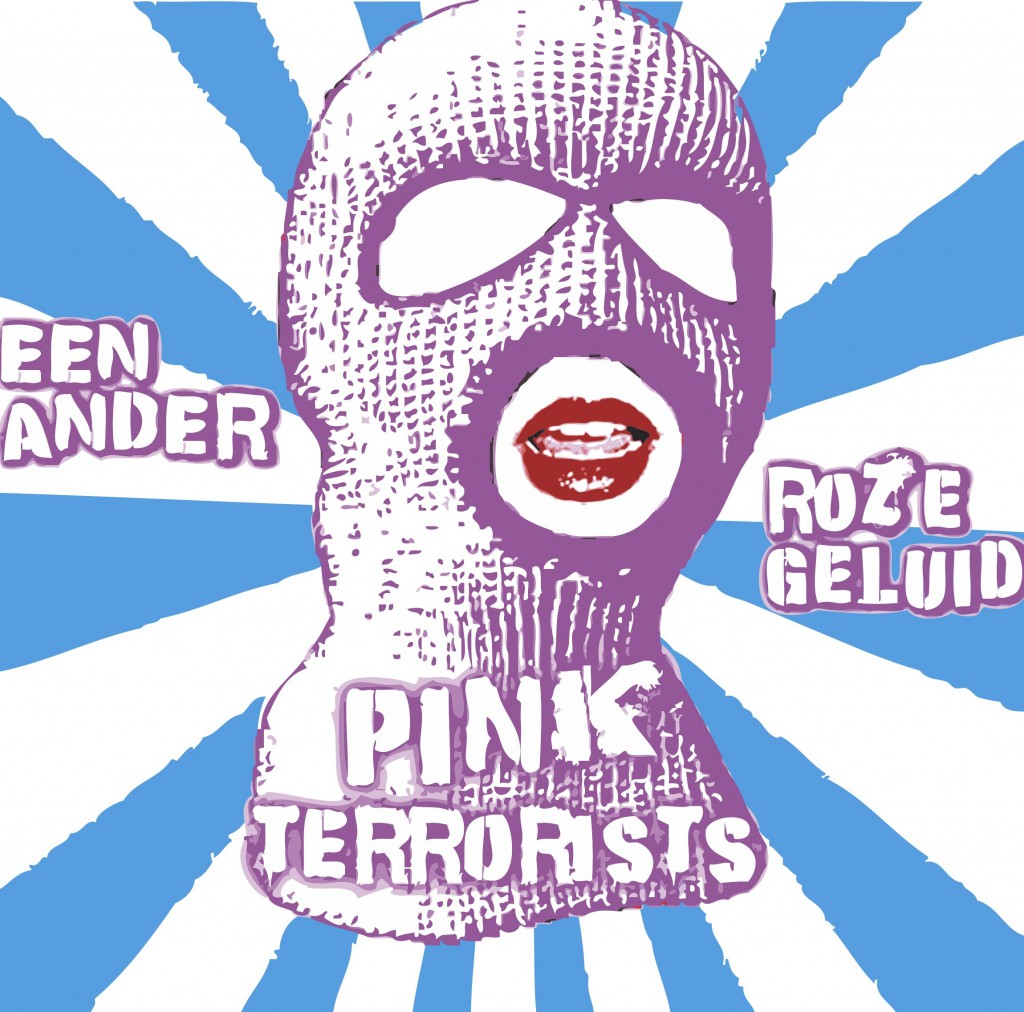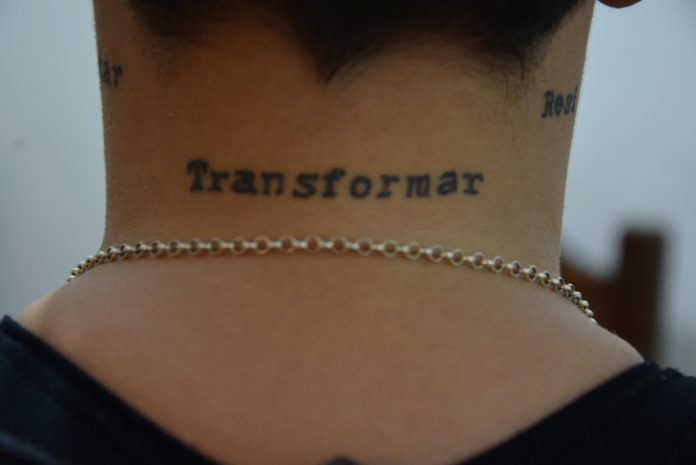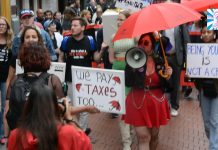TRANS BRASIL (scroll down for the English version of this text)
Toen wij in oktober 2016 na drie jaar het geboorteland van mijn echtgenoot bezochten, besloten we een paar transmensen te interviewen. In de drie jaar van afwezigheid is er in Brazilië veel veranderd. Na jaren van economische voorspoed kampt het land nu al weer een paar jaar met economische tegenwind en de economie krimpt al enkele jaren op rij, met veel maatschappelijke onvrede tot gevolg. Dit heeft uiteindelijk geleid tot de (oneigenlijke) afzetting van de linkse president Dilma Rousseff. In linkse kringen wordt deze machtswisseling een staatsgreep genoemd. De reden was, het mooier voorspiegelen van de economische situatie, dan dat deze in werkelijkheid was. Een boekhoudkundige truc die door haar voorgangers werd gebruikt en die na haar afzetting legaal werd gemaakt. Haar tegenstanders, waarvan de meesten werden onderzocht door justitie vanwege beschuldigingen van corruptie, zijn uiterst rechtse, conservatieve en aan de evangelische kerk gelieerde politici.De 77e jarige rechtse politicus Michel Temer is nu de nieuwe president. Vanwaar deze inleiding? Wij waren benieuwd naar de situatie van de lhbt+ gemeenschap, en vooral transgenders na de machtswisseling. Wordt de toegenomen invloed van de evangelisten en ultraconservatieven in de praktijk al ondervonden?
Mijn belangstelling voor transmensen is aangewakkerd door onze warme banden met de coc organisatie Trans United. Een groep gedreven mensen die zich inzetten voor de zichtbaarheid en emancipatie van biculturele transgenders. Zij hebben net een rapport gepubliceerd waarin de problemen waarmee deze groep kampt in kaart zijn gebracht. Deze zijn niet gering. Ana Paula Lima een van de initiatiefneemsters van de eerste boot voor(biculturele) transgenders tijdens de Canal Pride, is een Braziliaanse. Zij heeft ons meermaals verteld over de vreselijke positie van transgenders in haar land. Dit was o.a de reden waarom zij besloot haar land te verlaten en zich in Italië te vestigen. Tijdens carnaval in Brazilië enige jaren geleden ontmoette zij echter haar prins op het witte paard, Farish, van Surinaams Nederlandse afkomst, en was dit de reden waarom zij zich in Nederland vestigde. Daar besloot zij zich gepassioneerd in te zetten voor de emancipatie van transmensen.
Het door Trans United gepresenteerde rapport over de positie van (biculturele) transgenders, laat zien dat dit ook zeer noodzakelijk is. Het rapport maakt duidelijk dat de achterstand tot de arbeidsmarkt door allerlei redenen zeer groot is, dat de registratie van geweld tegen transgenders bij lange na niet op orde is b.v omdat dit wordt ondergebracht in de statistieken bij homofoob geweld en ook het medische traject wordt door allerlei redenen niet altijd even positief ervaren. Toch zijn er in Nederland stevige stappen gezet op het gebied van zichtbaarheid en emancipatie. Allerlei t.v programma’s maken zichtbaar waar transmensen in hun proces doorheen moeten en ook allerlei initiatieven uit de gemeenschap zelf dragen hiertoe bij. Via de link hier kunt u het rapport inzien
Terug naar de situatie in Brazilië. Is de situatie in Nederland al niet rooskleurig, kun je de situatie in Brazilië omschrijven als hemelschreiend. Het beeld dat er in het buitenland bestaat van een sensueel, seksueel tolerant en divers land, het land van het grootste carnaval ter wereld en de grootste Gay Pride ter wereld, wordt in de geweldsstatistieken van de UN’s Human Rights Council teniet gedaan. De Braziliaanse maatschappij is een uiterst gewelddadige maatschappij. Gedeeltelijk verklaard vanwege het machismo en de sterke invloed van de evangelische kerk. Ook de cijfers van huiselijk geweld zijn er schrikbarend.
Brazilië heeft de twijfelachtige eer om het land te zijn waar de meeste lhbt ers per jaar worden omgebracht ter wereld. Sommigen beweren dat er elke 26 uur een lhbt persoon wordt vermoord. Echter de statistieken zijn waarschijnlijk het topje van de ijsberg want net zo als in Nederland wordt het niet secuur bijgehouden. Vaak wordt het geschaard onder homofoob geweld of geeft de politie, die zelf vaak verantwoordelijk is voor het geweld, andere redenen op. Beroving of huiselijk geweld zonder de achtergrond van het slachtoffer te noemen. Onder het artikel vindt u wat schrikbarende statistieken.
Toch zijn er overal ter wereld helden, mensen die tegen de stroom inzwemmen en zich sterk maken om hun eigen positie en die van anderen te verbeteren. Dus toen wij op zoek gingen naar mensen die hun verhaal wilden doen d.m.v onze vriendenkring in te schakelen, troffen wij twee mensen. Voorbeelden die ondanks alles een leven voor zichzelf hebben opgebouwd en dit trots en vol overtuiging leven. We laten jullie als eerste kennismaken met de leraar filosofie, gelijktijdig bezig met zijn doctoraal filosofie Cin Falchi. Iemand die zonder steun van een organisatie ( zij zijn er wel maar niet zo goed georganiseerd als hier) voorlichting op scholen geeft, lezingen organiseert en ook als spreker wordt uitgenodigd om over lhbt+ kwesties te spreken. Hij woont in een uiterst conservatieve provincie stad en van hem is de uitspraak ” Leven is al een krachtige vorm van activisme in dit land”. Een moedig en innemend mens en hopelijk genieten jullie van het interview dat we met hem maakten. Ik wil jullie wel waarschuwen voor de heftige beelden die er in zijn gemonteerd.
Het volgende interview zal zijn met de theateractrice Leona Jhovs
Vergeet niet onze Facebook pagina Pink Terrorist te liken u kunt ons ook volgen op Instagram en we hebben een wekelijkse radioshow die wordt uitgezonden bij Salto Stads FM ieder woensdag van 19.00 uur tot 20.00 uur
More info on violence against LGBT people on Brazil:
Fron UN’s Human Rights Council:
LGBTQ Brazil Today: Endemic Violence Despite Legal Progress and Social Acceptance July 201
and
from Brazilian Ministry of Justice ( in Portuguese)
Relatório de Violência Homofóbica no Brasil: ano 2013:
*******************
ENGLISH:
Last October we visited my husband’s homeland and decided to interview some people there. Three years had passed since our last visit and in those three years a lot had changed. After many years of economic growth, the country is now in recession. Its economy has been shrinking for a few years on a row, causing a lot of social unrest which eventually led to the impeachment of President Dilma Rousseff last year, seen by the country’s political left as a coup d’État. The official reason for the impeachment was the President’s “creative accounting”, resulting in better budgetary results. The same accounting tricks had been used be her predecessors and legislation was changed just after the impeachment which made those same practices legal. Rousseff’s opponents, most of themselves under investigations of corruption, are mostly old, right-wing conservatives and many of them have ties to Evangelical Churches. The 77-years-old right-wing Michel Temer is now the country’s President.
Why all this introduction? We were curious about the situation of the LGBT+ community, especially transgenders, after this power switch. Had the growing influence of the Evangelical Churches and ultraconservative politicians already become visible in daily life?
My interest for trans people comes from our good ties with COC’s organization TransUnited, a group of motivated people who work hard for the visibility and emancipation of bi-cultural transgenders. TransUnited has just released a report outlining the problems that this community faces in The Netherlands. And those can’t be overlooked.
Ana Paula Lima, one of the initiators of the first boat for bi-cultural transgenders during Canal Pride Parade last year is herself Brazilian. She had warned us repeatedly about the appalling position of transgenders in Brazilian society, which had eventually led her to leave the country for a new life in Italy. Years later, during a visit back to Brazil she met her Prince on the White Horse: Farish, a Dutchman with Surinamese roots, and eventually relocated to Holland to join him. Here she became a dedicated fighter for the emancipation of trans people. The report recently released by TrandUnited shows that her efforts are much needed. Its main conclusions were:
there is a clear disadvantage position for transgenders in the work marketplace, for different reasons;
the reporting of hate crimes against transgenders must be improved, since most of it is simply registered as anti-gay violence;
the medical support by transitions is often criticized.
On the other side, The Netherlands have seen a lot of progress in terms of visibility and emancipation. TV programs and other civil organizations now tell the journey of transgender people to a much wider audience than ever before. Click here to read the whole report (in Dutch).
Now back to Brazil, where the situation for transgenders is much harder. The usual image of Brazil abroad, that of a sensual, diverse and tolerant country, host of the world’s largest Carnival and Pride parade, is in hard contrast with the UN’s statistics on violence against the LGBT population in the country. In fact, Brazilian society is extremely violent with high levels of domestic violence, partially due to widespread historic machismo and the recent growing influence of evangelical neopentecostal churches. Brazil holds the shameful number 1 position in the ranking of countries where the most LGBT people are killed. According to some organizations, a LGBT person is killed every 26 hours in Brazil and this statistics may well be only the tip of the iceberg, since most crimes are not reported and not all are reported as hate crimes. Another problem is that the police who should report and investigate the crimes are also often the perpetrators. Too often these crimes are logged as domestic violence or robbery, without any notice of the victim’s sexual identity. (Links to these alarming statistics are below on this article. )
Yet, around the whole world there are heroes to be found. People who swim against the tide to fight for a better position in society, for themselves and others. In Brazil we soon found two of these heroes with the help of our local friends. Two encouraging examples of people who against all odds managed to build a life for themselves and live it with confidence and pride. We first present you Cin Flchi, Philosophy teacher and Phd student, who independently organizes informative lectures on LGBT issues on schools at the conservative provincial town Marilia, where he lives. Cin’s motto is : Being alive is a powerful form of activism in this country. His courageous personality impressed us and we hope you enjoy the interview we did with him as much as we did. A little warning: some images of violence against travestis may be too hard for some viewers.
Our next interview is with theater actress Leona Jhovs.
Don’t forget to like us on Facebook, follow us on Instagram, subscribe to our YouTube channel and listen to our radio show, every Wednesday, from 19:00 to 20:00 hrs on Salto Stads FM.
More info on violence against LGBT people on Brazil:
Fron UN’s Human Rights Council:
LGBTQ Brazil Today: Endemic Violence Despite Legal Progress and Social Acceptance July 201
and
from Brazilian Ministry of Justice ( in Portuguese)























